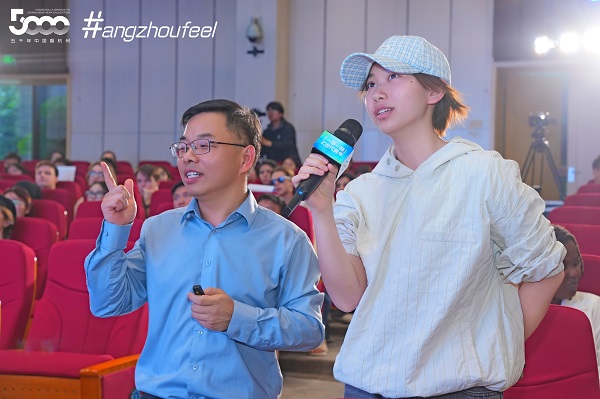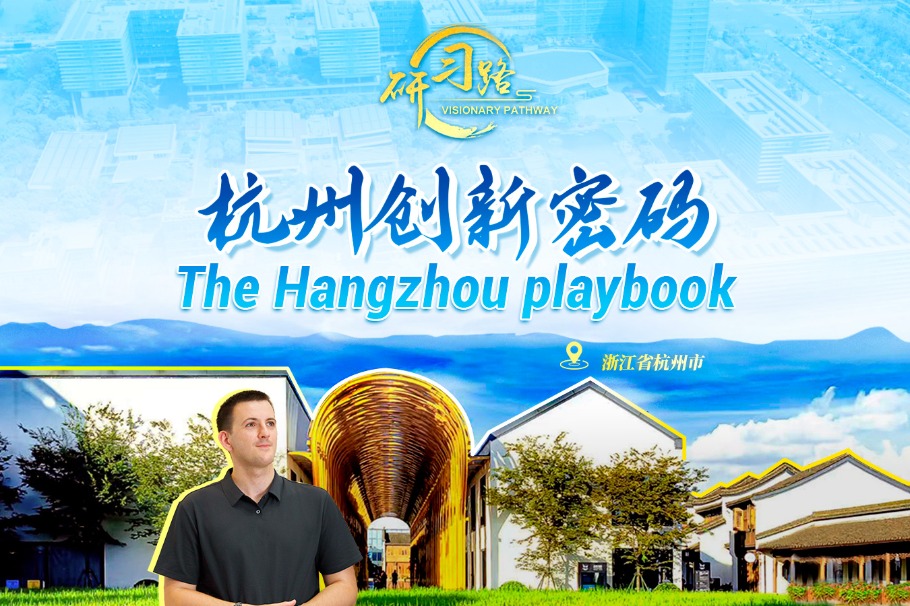Gen Z meets AI: cross-border e-commerce bootcamp wraps up
The vibrant "Belt and Road" Gen Z AI and Cross-Border E-commerce Bootcamp has recently concluded at Hangzhou Normal University (HNU). Jointly organized by the Hangzhou International Communication Center, the Alibaba Business School, and the International Education School of HNU, the bootcamp has attracted over 100 international students from countries including South Korea, Vietnam, Morocco, and Rwanda. The program explores the evolving landscape of cross-border e-commerce in the era of the digital economy.

International students participate in the "Belt and Road" Gen Z AI and Cross-Border E-Commerce Bootcamp.
"In the past, we taught students to upload product images. Now, it's about using AI to generate multilingual product descriptions," said Zhang Jianlin, executive dean of the Alibaba Business School, highlighting the seismic shift in the e-commerce sector over the past decade in his opening speech.
Ma Jun, deputy secretary of the International Education School at HNU, emphasized the strategic role of international students in this field, "Over the past 10 years, we have trained nearly 5,000 students from countries involved in the Belt and Road Initiative. They are not only cultural ambassadors but also innate operators in the cross-border e-commerce ecosystem, with deep knowledge of local markets and firsthand experience in China's e-commerce landscape."
The bootcamp features real-life success stories shared by Jin Guichao, assistant dean at the Alibaba Business School. He recounted how a 2020 graduate turned his girlfriend's hand-painted artwork into a best-seller on Etsy before pivoting to pandemic-related pet products, now generating over 100 million yuan ($13.93 million) in annual sales. Another team, after intensive research into European women's lingerie sizes, transformed "Made in China" products into a top-seller on Amazon, shipping thousands of items daily. From humble beginnings selling instant noodles, another student now operates a multi-platform business across Shopee and TikTok, with annual revenues of 300 million yuan and a self-established overseas warehouse in Thailand. "These stories prove that with the right strategy, even small teams can tap into global markets," Jin noted.
On May 17, students advanced to hands-on practice, showcasing their video marketing assignments with the theme, "Hangzhou, a window to Chinese 5,000-year civilization." Participants produced short videos promoting iconic Hangzhou products — silk, Longjing tea, and oil-paper umbrellas — highlighting the intersection of digital technology and cultural storytelling.
AI expert Tang Chao delivered a session on AI's role in cross-border e-commerce, emphasizing that AI tools enhance content creation but cannot replace human creativity and emotional connection. He demonstrated AI applications in scriptwriting, visual design, and copywriting for short videos, underscoring AI's value in content generation.
Media and branding expert Li Zi, a former CCTV journalist and Alibaba branding professional, guided students through AI-assisted video production, using tools like DeepSeek to generate engaging scripts and narratives. She encouraged students to draw on their cultural insights and creative strengths, emphasizing the "three-second rule" for content impact and the importance of branding elements at the end of each video.
The program concluded with a certificate ceremony led by Jin Guichao and Li Zi, who praised the students' creative efforts, especially videos themed around AR glasses and Longjing tea. Both speakers urged students to continue exploring AI tools and to tell compelling China stories that resonate globally, helping the world discover the beauty of Hangzhou and the richness of Chinese culture.
-
Xi Story: West Lake and beyond
August 6, 2025
-
Nine Hangzhou-based companies make Fortune Global 500 list
July 30, 2025
-
City built on water: Hangzhou's wetland legacy goes global
July 25, 2025
-
Visionary Pathway - Hangzhou Playbook
July 15, 2025



